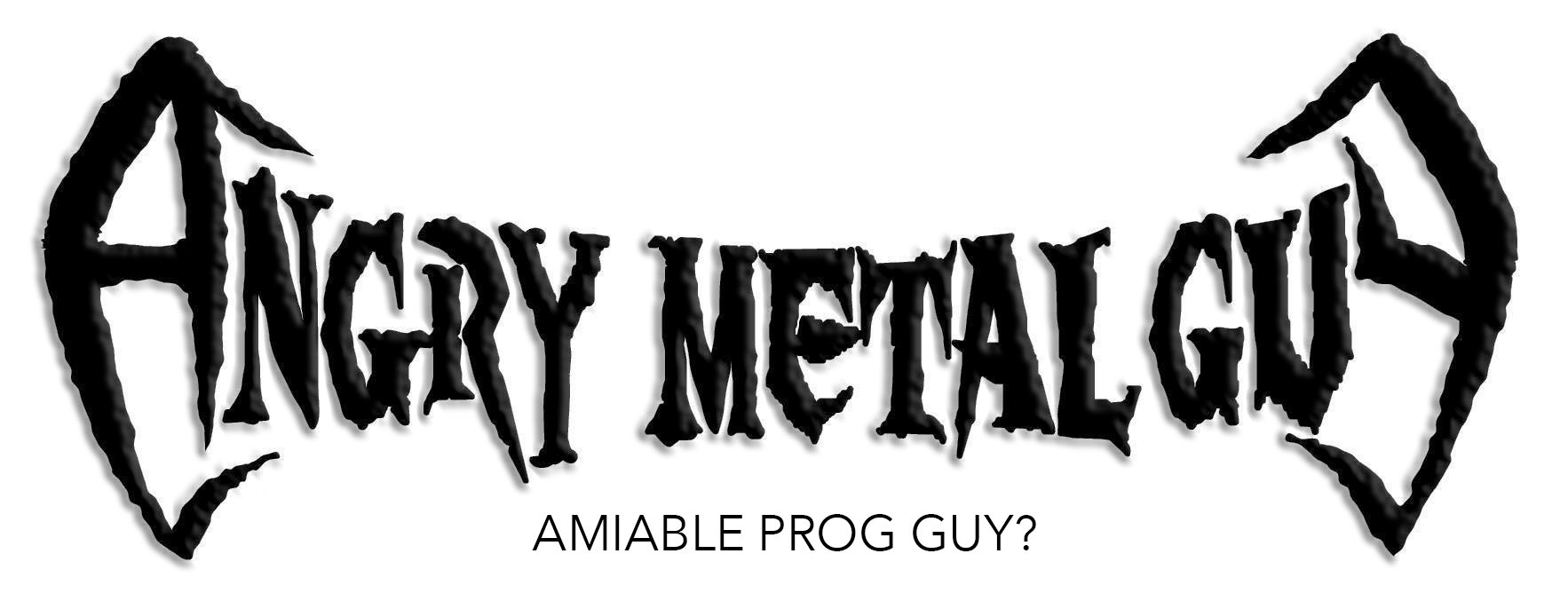On September 4th, Iron Maiden released its 16th studio album. This new platter is a double-disc monstrosity by the name of The Book of Souls, and now that I’ve received my physical copies, I’m going to be re-listening to it a dozen times with lyrics in hand. So, while we’re waiting on this I’m taking advantage of the moment to do something I’ve wanted to do for a very, very long time: a huge Iron Maiden retrospective, spanning the band’s entire studio discography. Here’s the fourth installment. [And here’s the first, second and third.]
#6: A Matter of Life and Death [2006]: When Iron Maiden made the decision to play the entirety of A Matter of Life and Death on the road, I applauded that choice. Dance of Death had been a disappointment on the whole, after a great Brave New World, DoD didn’t have the same cohesion to it, despite its excellent highlights. When 2006 rolled around and the band released “The Reincarnation of Benjamin Breeg” as the single1, I was admittedly extremely worried. But Maiden delivered, and A Matter of Life and Death is one of the most complete records they had produced since Seventh Son of a Seventh Son and easily the best of the post-reunion era.
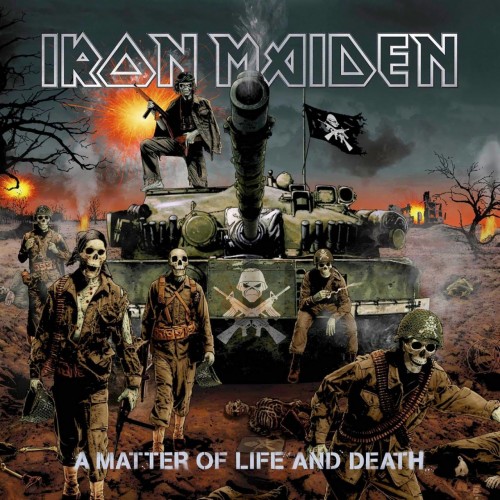
A Matter of Life a Death features some of the band’s best sound on a Maiden album since the 1990s. After the blowback from fans about how bloody loud Dance of Death was, the band actually made the decision to not even get it mastered, instead letting the Caveman do an in-house mastering job. While this is still a point of contention among fans, I think that this was a fantastic decision, and when played next to its more modern kin, the album simply sounds great. It’s got a live feel, with Bruce’s vocals being far more stripped down and further back in the mix than he may ever have been prior to this. I love Nicko’s drum tone here, and my only wish is that Harris’s bass sounded a bit more like it did in 1983 than it does here.
And as far as long records go, A Matter of Life and Death is worth nearly every minute of its 72 minute run-time. If I had to choose one track to drop it would be the opener “Different World,” which is the blandest of the songs on this record. But this OK opener is followed up by the great “These Colours Don’t Run” before merging into one of the best modern Maiden tunes ever: “Brighter than a Thousand Suns.” “Brighter than a Thousand Suns” is indicative of why this album is such a success; even the epics on this record—a place where modern Maiden is guilty of letting things bloat—are executed with alacrity and grace. “The Longest Day” is a step up from “Paschendale,” while “Brighter than a Thousand Suns” shows Dickinson’s lyrical breadth in full bloom and doesn’t even bother hiding the band’s progressive leanings.
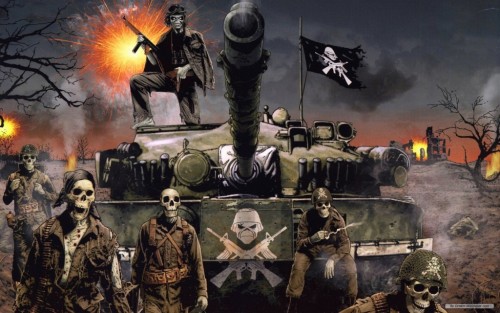
The final three songs on A Matter of Life and Death are the feather in the cap of one of the band’s best albums. “For the Greater Good of God” fits the mold of the modern Harris epic, with introspective lyrics, a 9:25 run-time and a long bass intro—but the formula shines here, while the song sets a grim and dour tone. “Lord of Light” features an epic build, an extremely good chorus, and a crescendo on the back-end worthy of Maiden’s best songs. But for me, “The Legacy,” a song which I’ve always interpreted as critical of the lead up to the Iraq War (note: baseless speculation), is the perfect ending to the album. While it features the oft-ridiculed acoustic intro of the band’s modern material, the mid-paced verses with vocals from Dickinson that sound like they’re being sung through a megaphone are perfect. The whole thing carries a weight and finality that finishes the album off with the drama and gravity it deserves.
A Matter of Life and Death may be the band’s most underrated record aside from The X Factor. Fans complained about the cohesion of the material (that is, that the material was too cohesive.. whut?), they argued that the album was too quiet (use your fucking volume knobs, that’s what they’re there for!), and they complained about the fact that the band played the whole album on the road. None of that makes sense to me. The pinnacle of an album as an art form is not that it has three songs we all remember and love, but instead that it works as a cohesive whole with a feel and structure all its own. The material on AMoLaD was not only well-written, which means the songs generally stand alone, but the record was built with the kind of flow that knocks records from great to excellent. This album represents the pinnacle of the band’s post-reunion material, and a record that I place equal to (or even above) records that are widely considered the band’s classics.
#5: Powerslave [1984]: If there is a record that I would argue is canonical for the Iron Maiden’s fan base as the “Best. Record. Ever.” it’s definitely Powerslave. I have a theory about this (shocking, I know). While Maiden had been successful for quite some time, Powerslave was the record that really broke them into the minds of American fans. This “American fans” bit is important, because it’s rarely Brits who tell me that this record is the jewel in Maiden’s very metal crown; it’s almost always 45+ dudes from the U.S. who say this. Why? Well, I suggest it’s largely because this is the first Maiden record that most of these dudes heard, and it was the one that really launched the band into the stratosphere in the U.S. market. They toured so hard in the USA that Dickinson burned out and showed up with acoustic tracks, suggesting that what would become Somewhere in Time should just take it down a notch or “come up with [their] Physical Graffiti or Led Zeppelin IV” as to not stagnate.2 But due to this absolutely life-consuming work the band put into promoting this record, Powerslave is the Iron Maiden record for a lot of people. A sort of collective primacy effect.
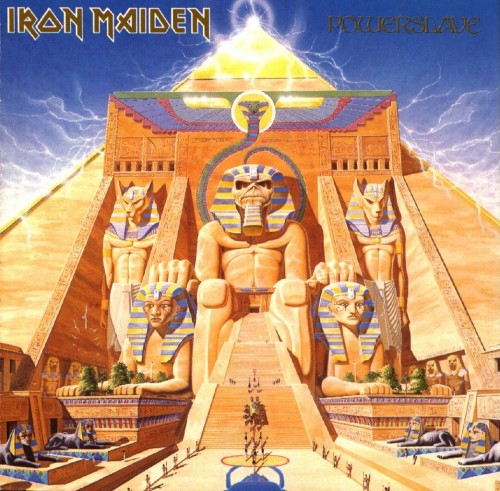
And if I’m honest, there are some pretty good arguments for Powerslave ranking pretty high on everyone’s lists, it certainly ranks high on mine. A better start to an album is extremely hard to come by: “Aces High,” “2 Minutes to Midnight,” “Losfer Words (Big ‘Orra),” and “Flash of the Blade” rattle off pure enjoyment as they pop out of the speakers. I love how these tracks feel, with trademark gallop, and a riffy, tom-heavy Nicko McBrain giving the album an energy that the band’s later material simply doesn’t have. These tracks are fast, energetic and written with a precision still admirable. The Dickinson-penned “Flash of the Blade” is probably at the top of my list of songs I’d love to see Maiden perform live, and the guitar harmonies in that song are memorable, beautiful, and among my favorite moments on an album ever. Speaking of which, I think this might be one of the best-produced albums the band put out. Martin Birch definitely knew how to produce Maiden by the time Powerslave rolled around, but there’s a special balance and weight on the low end here that works great, and the Marshall-driven guitars work beautifully. If you can get yourself an original version (not one of the 1998 remasters), you can hear the whole thing just breathe and pop and awe; it sounds so good.
The b-side has always been a bit less thrilling for me, however. While I love the title track, like “The Duellists” and think “Back in the Village” is pretty good, I have never been able to stomach “Rime of the Ancient Mariner.” At 13:41, “Rime of the Ancient Mariner” is bloated, clunky, and may be the only classic epic the band wrote that I don’t like. I have been harassed and regaled with tales of this song’s glory for my whole life, and I cannot get into it for the life of me. And it’s because of this albatross around Powerslave’s neck that I have trouble placing this album higher on the list, and how I can definitely not get on board with the deification of Powerslave that happens every time there’s a discussion about Maiden albums.

Still, though, while I think “Rime of the Ancient Mariner” is a black eye on Powerslave, it is a magnificent record. The classics on here are undeniable and rarely has an a-side been so strong that it almost outweighs a lagging b-side. I can absolutely see why people loved this album when it hit. I can imagine that my mind would have been blown if I was a 17 year-old metalhead and not a 2 year-old Cranky Metal Toddler—but the beauty of time is distance and perspective, and distance makes me realize that Powerslave isn’t perfect. Just y’know, 90% perfect, and a classic in its own right. (Then again, “the top 5 Iron Maiden albums” and “a classic in its own right” are pretty much synonymous. I guess that makes that sentence a bit redundant.)
#4: The X Factor [1995]: The X Factor is Iron Maiden’s most controversial record. With a nigh unknown vocalist, who sported a tone and tenor totally unlike Dickinson, and right in the middle of the high-tide of grunge rock, Maiden launched an album that broke the mold of its own sound, while still managing to not be commercially viable. TXF is dark, it’s slow, it’s long, and it was a statement that the Maiden everyone knew and loved had changed. Unlike Virtual XI, which I’ve never met a person who wouldn’t rank it in their bottom 5, The X Factor has instilled a type of deep loyalty with a subset of Maiden fans—of which I am obviously one. My placement (or lack thereof) of The X Factor up to this point has turned the comment fields of these posts into a non-stop festival of ad hominem attacks, outraged cries, admissions of logical inconsistency and desire to conform to the group consensus, and threats of mob violence. And I’m sure you will all double down on the personal threats, whining, and self-righteous indignation when you see that I’ve put TXF at number four on this list. I’ve gone back and forth on this for a really long time; but no matter how far down my list TXF has fallen, it always creeps back in to the top tier.
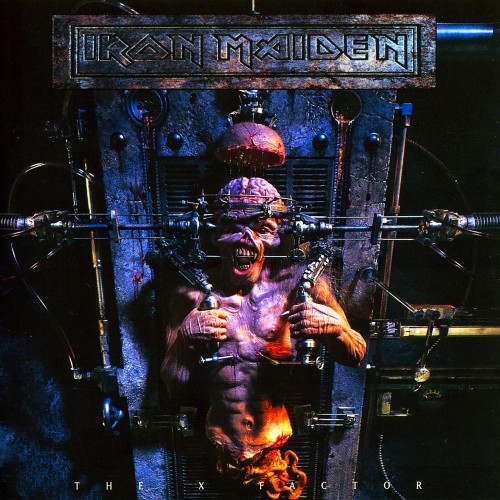
The X Factor is one of the few records from a band where I am willing to make the “counterfactual album” argument in conversations with other fans. Not the ridiculous “this is so much better than all the other music being released” argument, but instead: “think of this as not being an Iron Maiden record” argument. This isn’t because I don’t believe that this stands up to Iron Maiden’s other albums—I personally think it’s among their best records and would have been comfortable putting it anywhere in the middle third of this list. But I am making this argument with the hope of changing your perspective on the record and to help you to understand (at worst) why I like it so much, or (at best) appreciate it more than you do. The X Factor is an extremely personal, heavy, and difficult record from an emotional perspective. It’s that deep, emotional side and the subtle progressive drive which have kept me coming back to what I think is an unfairly disregarded and misunderstood record.
First, The X Factor is loaded with difficult material, insightful and often times quite depressing. It manifests a feeling of the world of inexpressable misery, loneliness, heartbreak and a loss of faith. From a personal perspective, Harris had gone through a divorce and the songs that were written after Bruce left were reflective of, to a certain extent, the end of two of the most important relationships of his life. I might be wrong, but I suspect he may also have been breaking away from his own faith, which also reflects in the lyrics. Songs like “Judgement of Heaven,” (“A lonely cry for help / reaching out for help to anyone / a silent prayer to God to help you on your way / I’ve been depressed so long, it’s hard to remember when I was happy / I’ve felt like suicide a dozen times or more”) and “The Unbeliever” (“All of my life / I’ve run astray / Let my faith slip away”) reflect these crises of faith in oneself or one’s God. The Bayley penned “2 A.M.” offers up a harsh look at the bitterness of life in terms very real to way too many people (“Life seems so pathetic I wish I could leave it all behind / This canvas chair, this bed, these walls that fall in on my mind”).
While the lyrics in Maiden have often been dark or had a cynical take on things, the energy with Blaze in the band was much more raw and open than anything their previous vocalists could muster. Even when writing about fiction the tracks are “Lord of the Flies” and “The Edge of Darkness” or “Man on the Edge.” The war epics? More like stories of soldiers suffering from PTSD (“Fortunes of War”), or the utter futility and waste (“The Aftermath”), or how the world throws up its hands and shifts the blame on “Blood on the World’s Hands,” which features one of my favorite lyrical moments at the end of the song, where Blaze finishes the song with “Someone should…” These songs are often quite slow, they’re dour and grim and specifically they’re really minimal and austere. The X Factor uses more white space in its mix than the band ever used before or since. This is the closest that Iron Maiden ever got to doom metal.
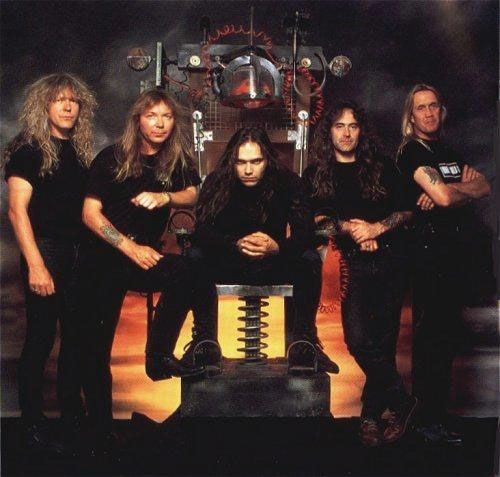
All of this put together, The X Factor flows and it flows well. As a whole, the record moves with a remarkable grace, given that its songs are often lumbering giants. Like the albums that followed it, The X Factor has a long run time, and it’s made up of songs with acoustic intros, bass interludes and lots of chorus repetitions. But The X Factor works, and it works because it’s so different from anything the band had done before, and it works because it was suited for what Blaze was good at. For a fan breaking out this album after a 15 years of fandom and hearing Iron Maiden in this state, this record must have been a shock. It certainly doesn’t help that this record has weak, flat production, chaired by Steve Harris and Nigel Green. But that never mattered to me nearly as much as the songs have mattered to me. TXF is the first record that these guys wrote that touched me emotionally as well as musically. Its darkest components, as well as its flow and consistency, have kept it among my most-listened-to Maiden albums. I’ve gone through periods where I have trouble listening to it—be it Blaze’s shaky vocals or the production or simply that the feel is so depressing and rough—but I always come back to it.
By ranking The X Factor here I’m claiming that it’s a better record than widely-regarded classics. I stand by that claim; but I also claim that it is so much different when comparing it to Piece of Mind or Powerslave or Killers or even Virtual XI, that such comparisons become nearly irrelevant. I don’t think Blaze was ever a great fit for Maiden. He was never helped by the band’s refusal to tune down, and it was never reasonable that Iron Maiden could replace Bruce with someone whose range was simply several steps down from his. But Blaze was the guy Maiden (and Steve) needed for this record, in this moment, and it’s that tiny window and that perfect confluence of factors which makes The X Factor excellent and among the very best Iron Maiden has produced.
